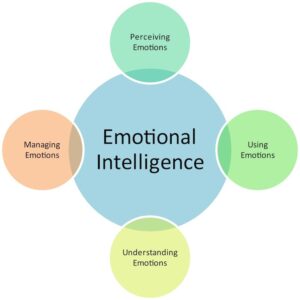Do you often feel like you’re at your wits’ end when it comes to your emotional health? Are you struggling to overcome traumatic experiences from the past? If so, then you may want to consider trying emotion-focused therapy. This revolutionary new approach can help you heal your emotional wounds and restore balance to your life. In this blog post, we will discuss what emotion-focused therapy is and how it can benefit you. We will also provide a few tips for getting started with this type of therapy.
Contents
What Is Emotion-Focused Therapy?
 Emotion-focused therapy (EFT) is a revolutionary new approach to treating emotional wounds. EFT is based on the premise that our emotions are powerful forces that can shape our lives. By working with a therapist who understands how to harness the power of our emotions, we can heal from past traumas and learn to live more fulfilling lives.
Emotion-focused therapy (EFT) is a revolutionary new approach to treating emotional wounds. EFT is based on the premise that our emotions are powerful forces that can shape our lives. By working with a therapist who understands how to harness the power of our emotions, we can heal from past traumas and learn to live more fulfilling lives.
It is a relatively new therapy, but it has already shown great promise in treating a wide range of emotional issues. One of the most exciting things about EFT is that it can be used to treat both individuals and couples. This type of therapy is based on the work of Dr. Leslie Greenberg, who is a world-renowned expert on emotions and their impact on our lives.
If you are struggling with emotional issues, then emotional-focused therapy can be a great option for you. It is a safe and effective way to heal your emotional wounds and start living the life you deserve. If you would like to learn more about EFT, then please speak with a qualified therapist who can help you get started on your journey to healing.
How Does It Work?
This type of therapy is based on the premise that our emotions play a vital role in our lives, and that by exploring and understanding them, we can heal the wounds they have inflicted. In essence, it is a way of using our emotions as a guide to help us understand ourselves better and make positive changes in our lives.
There are three phases of emotion-focused therapy on which the entire process is based:
The first phase is called “stabilization.” In this phase, the therapist helps the client to identify and understand their emotions, as well as to develop coping mechanisms for dealing with them. This phase is important in helping the client to feel safe and secure enough to move on to the next phase.
The second phase is called “exploration.” In this phase, the therapist helps the client to explore the origins of their emotions, as well as the role they play in their life. This is done through a variety of techniques, such as journaling, free association, and dream analysis.
The third and final phase is called “transformation.” In this phase, the therapist helps the client to make the changes necessary to transform their lives. This may involve making changes in their relationships, career, or lifestyle. It is through this process that the client can finally begin to heal the emotional wounds that have been holding them back.
If you are struggling with emotional pain, consider seeking out a therapist who specializes in emotion-focused therapy. This type of therapy has the potential to revolutionize your life and help you to heal in ways you never thought possible.
What Techniques Are Used In EFT?
 As with other therapies, emotion-focused therapy also revolves around building a trusting relationship between client and therapist. The focus, however, is on the emotions themselves. The therapist will help the client to identify, understand, and healthily express their emotions.
As with other therapies, emotion-focused therapy also revolves around building a trusting relationship between client and therapist. The focus, however, is on the emotions themselves. The therapist will help the client to identify, understand, and healthily express their emotions.
Some main techniques are used in emotion-focused therapy:
Focusing
This technique helps the client to focus on their emotions and bodily sensations. It is a way of “tuning in” to emotions, which can be difficult to do in our fast-paced, constantly-stimulating world. More often, in the focusing technique, clients will be asked to close their eyes and imagine a safe place.
Tracking
This technique involves the therapist helping the client to track their emotions throughout the day. The therapist will ask questions about what triggered the emotions, how long they lasted, and what made them better or worse. This tracking can be done in a journal, on a smartphone, or even just by talking to the therapist at the next session.
Empty Chair
In this technique, the client imagines sitting in a chair across from someone who represents an important person in their life. The therapist then helps the client to have a conversation with that person, working through any unresolved issues. This can be an incredibly powerful way to work through past trauma and heal emotional wounds.
Emotion regulation
This is a process that helps us to manage our emotions healthily. It can be helpful for those who tend to experience negative emotions more often than positive ones, or for those who have difficulty managing their emotions in general.
These techniques are designed to help the client become more aware of their emotions and learn how to manage them in a healthy way. Thus, if you find yourself struggling to cope with your emotions, or if you are simply interested in learning more about how to manage them, emotion-focused therapy may be right for you.
What Are The Benefits?
 There are many benefits to emotion-focused therapy. Some of the few are as follows:
There are many benefits to emotion-focused therapy. Some of the few are as follows:
- Helps patients understand and work through their emotions in a constructive way
- Aids in developing healthy coping mechanisms to deal with difficult emotions
- Can help improve communication and relationships
- Promotes insight and self-awareness
- Encourages positive thinking and new perspectives
The benefits of EFT are vast and far-reaching. If you are struggling to cope with your emotions, or if you feel like you’re stuck in a negative thought pattern, EFT may be able to help you. For example, if someone is struggling with anxiety, EFT can help them to understand and work through their anxious emotions more constructively.
In addition, EFT can also help to improve communication and relationships. By promoting insight and self-awareness, EFT encourages positive thinking and new perspectives. If you are looking for a way to improve your emotional well-being, emotion-focused therapy is a must-try!
What Conditions Emotion-Focused Therapy Treats?
There are several conditions that emotion-focused therapy can effectively treat, these include:
- Anxiety disorders
- Depressive disorders
- Eating disorders
- Posttraumatic stress disorder (PTSD)
- Substance abuse
- Couples and relationship issues
By working through the emotions that are at the root of these conditions, clients can achieve lasting healing and relief. However, these might sound like big problems and you might be wondering if EFT can help with something so significant.
The great news is that emotion-focused therapy has been proven to be an effective treatment for a wide range of issues, both big and small. In fact, research shows that EFT is particularly successful in treating emotions that are at the root of much mental health distress.
If you are struggling with any of the above conditions, or if you simply want to explore your emotions in a safe and supportive environment, then emotion-focused therapy could be the right choice for you.
What Are The Limitations?
 There are some possible limitations to emotion-focused therapy to be aware of. These include:
There are some possible limitations to emotion-focused therapy to be aware of. These include:
- Sometimes, there could be too much focus on emotions and not enough focus on practical problem-solving. This might be the case if you’re dealing with more minor issues, or if you’re in a therapy session that’s only an hour long.
- Emotion-focused therapy can also be expensive since it often requires more sessions than other types of therapy. Because of this, it might not be an option for everyone.
- It’s also important to note that emotion-focused therapy is a relatively new type of therapy. This means that there isn’t as much research on it as there is on other types of therapy. However, the research that has been done so far is promising.
- Finally, keep in mind that emotion-focused therapy is not a magic cure-all. Like with any type of therapy, it takes time, effort, and commitment to see results.
If you’re considering emotion-focused therapy, talk to your therapist about whether it might be right for you. Sometimes, a combination of different types of therapy is the best approach. Emotion-focused therapy can be an incredibly powerful tool for healing emotional wounds. With time and commitment, it has the potential to help you lead a happier, healthier life.
Conclusion
In conclusion, emotion-focused therapy is a revolutionary new way to heal your emotional wounds. It is based on the premise that emotions are the key to healing. And that by exploring and understanding our emotions, we can heal ourselves. This type of therapy is highly effective in treating a variety of mental health issues and is an excellent choice for anyone looking for a new way to improve their quality of life.
Therefore, it can be said that emotion-focused therapy is a very beneficial form of treatment that can help people in multiple ways. If you or anyone you know is struggling with mental health issues, consider seeking out a therapist who specializes in this type of therapy. It could be the key to finally healing your emotional wounds.
For more information and guidance please get in touch with our expert therapists at Therapy Mantra. They will be more than happy to assist you on your journey to recovery. Contact us today to learn more about our services. You can also book an online therapy session or download our free Android or iOS app.


